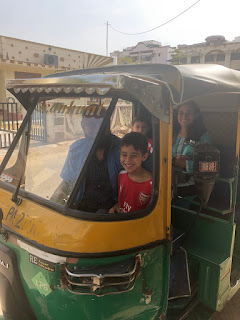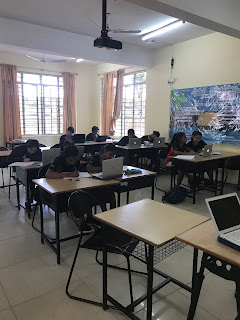Design Thinking Process in Primary Years a.k.a. James and Ashram
I think that I have said this before, that my journey in India about active learning has not only come from my learning experiences with graduate students in education and the middle school at Indus, but with my own children. James and Ashram have been learning about the design thinking process and today at their school they had a leadership summit where I got to see, hear, and engage with their understanding of the design thinking process.
While James and Ashram are pretty new to this thinking, they can articulate problems they see and offer suggestions on how to solve them. Other students that have been at Indus since reception which is 4 years old can really talk about the Design Thinking Process (DTP). Check out this one student below talking about how to conserve water by reusing rain water. He is in James' class. Oh and the girl above created a prototype using legos. She wanted to solve the problem of wet swing set seats after it rains. She did not like getting wet so she created a prototype of a swing set seat that is reversible. When a seat is wet you simply turn it over and use the other side that is dry. Pretty clever. She is also in James' class and is only 7 or 8 years old.
Here is some of the things that James and Ashram have done and jumped right into learning at school in India.

James lead a station on deep reading and the importance of deep reading. He talked about all the different kinds of books you could read. He likes novels and comics the best.
 Tikkum Olam is a jewish concept defined by acts of kindness performed to perfect or repair the world.
Tikkum Olam is a jewish concept defined by acts of kindness performed to perfect or repair the world.
Their school really tries to teach the whole child from mindfulness to thinking about the world they live in to creating solutions. Very dynamic way of learning and of course they have the regular reading, writing, and math. But it seems to me that they really try to find a balance.

Ashram comes home everyday and asks for the plastic bottles so he can reuse them. They definitely enjoy the hands on activities. As a matter of fact, don't we all?
 Tikkum Olam is a jewish concept defined by acts of kindness performed to perfect or repair the world.
Tikkum Olam is a jewish concept defined by acts of kindness performed to perfect or repair the world. Their school really tries to teach the whole child from mindfulness to thinking about the world they live in to creating solutions. Very dynamic way of learning and of course they have the regular reading, writing, and math. But it seems to me that they really try to find a balance.

In the end, I still am stuck asking the same question...what happens after elementary school? Why do we stop teaching and developing the whole child?









Comments
Post a Comment